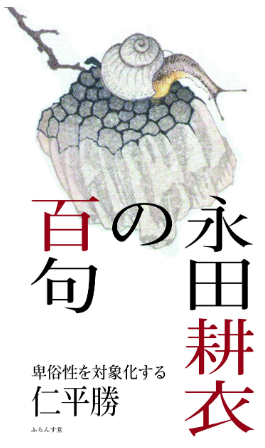127. The "Plow" Radical: 耒
The six-stroke 耒 radical is as indestructible as a plow. That is, the radical has no variants and therefore maintains its shape while on duty in these two kanji:
耕 (673: cultivating land)
耗 (1853: depletion)
The autonomous non-Joyo 耒 means "plow." And the radical continues to represent "plow" in 耕. Henshall says in his newer edition that 耕 combines "plow" with "well," though the 井 acts phonetically to convey "manage the land," yielding "manage the land with a plow" as the overall meaning.
As for 耗, that's a different story because according to Henshall, the left-hand side was initially 禾 (grain). Actually, we'll come back to 禾.

We find 耕 in the name 永田耕衣 (ながた こうい: 1900–1997). That name dominates the cover of this collection of 百句 (ひゃっく: 100 poems).
The Names of the 耒 Radical
The 耒 kanji carries the sounds すき and ライ, among others, which explains these radical names:
すき すきへん らいすき らいへん
The -へん corresponds to -偏, the position name for a radical on the left side of a kanji. (For more on that nomenclature, see Radical Terms and check the "Radical Positions" section.)
The name らいすき combines two of the aforementioned yomi of 耒.
The English names of the 耒 radical include "plow" (or the British "plough") and "three-branched tree." That last name distinguishes this radical from the following:
radical 75: 木, the "tree" radical
radical 115: 禾, the "grain" or "two-branched tree" radical
